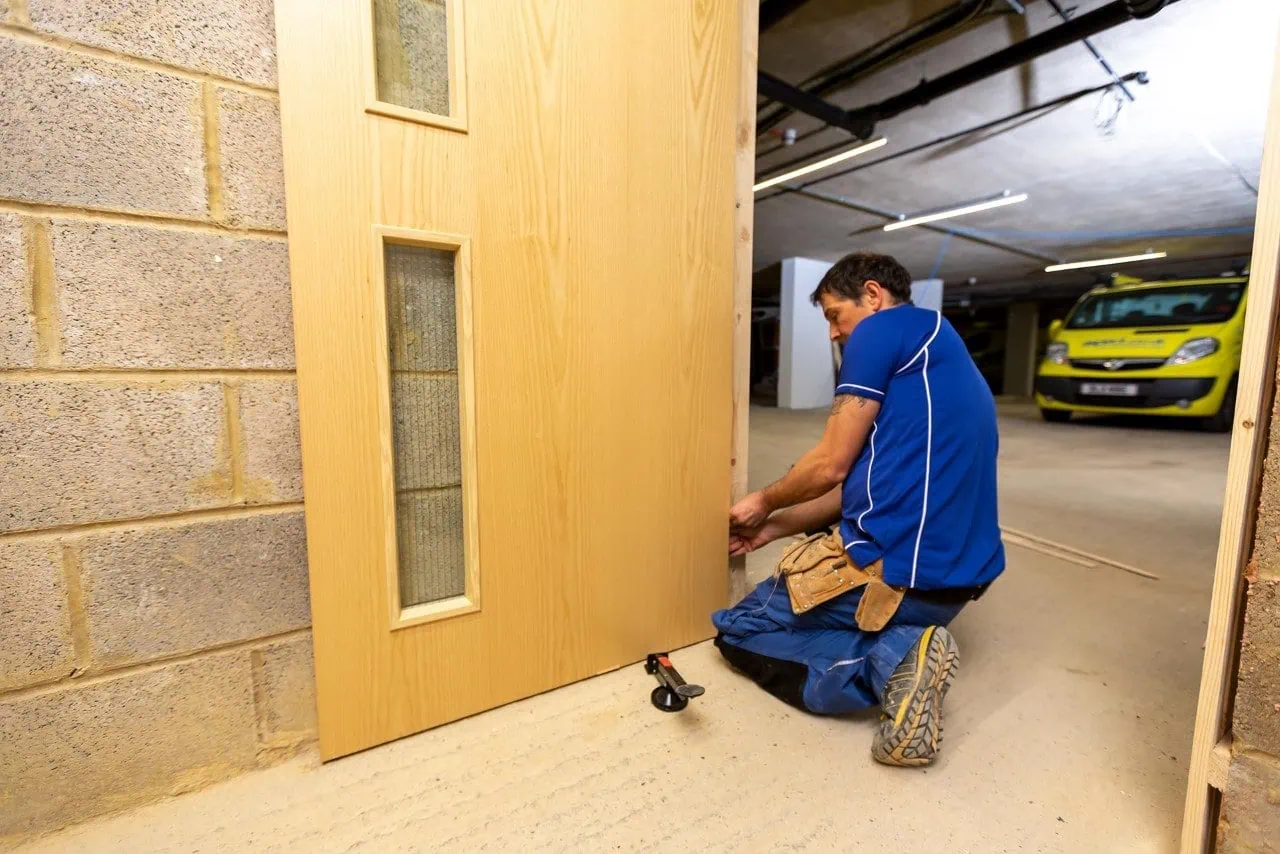Fire door regulations for residential properties
New updates to government fire door installation regulations mean that more residential properties are required to have fire doors fitted.
Fire door installation regulations are legal obligations and could amount to serious consequences if ignored, including fines, invalid insurance, and prosecution in the event of a fire.
So, how do you know if your property needs fire doors installed? We’ve created a summary outlining what residential owner–occupiers and landlords need to know about:
- What kind of properties need them
- Who is responsible for making sure a property has them
- How to go about getting fire doors installed

Properties with more than one residence
Below are the instances in which fire doors are required in both new builds and conversions:
- HMOs (houses of multiple occupancy) and every flat within a block of flats – fire doors are needed at the entrance of every communal area.
- Flats that are on floors 4.5m above ground level – fire door inspections must be taken. Fire doors must be installed between all habitable rooms as well as the door opening onto a communal corridor or stairwell.
NB: A ‘habitable room’ is defined as a room within a residence used for living, sleeping, or cooking.
- In multi-occupied residential buildings over 11 metres, fire doors are required between all habitable rooms and the front door of each residence.
NB: In this case, the height of a building is measured from the floor of the lowest point in the building to the floor of the highest habitable space, which includes a loft conversion.
- Residential properties that are under 11 metres in height but have two or more separate dwellings sharing a common escape route. For example, two flats in the same building that open onto communal areas, such as a shared corridor that leads to a single main front door.
Ground floor flats do not need internal fire doors as long as each room has an accessible way to escape a fire, such as a window or a door which is not communal.

Get in touch if you have questions about how fire door installation regulations affect you.
- Free estimating service available
- Local, trade accredited experts
- Fast project scheduling
- Clear pricing – no hidden extras
Single residence properties
Although most single residences do not usually require fire doors by law, there are some exceptions:
- In new builds and home renovations that have three or more floors, every habitable room that leads from the main stairwell must be fitted with a fire door. This also includes former two-storey properties that have had a loft conversion.
- Any door leading from your home into an internal garage or basement must be a fire door.
Knowing which rooms in a property need fire doors can sometimes be confusing. We therefore recommend referring to the government Building Regulations for England and Wales for guidance, or asking a fire risk assessment officer.
Do I need to install a fire door in a property I am renting out?
It is the responsibility of the landlord or homeowner of a property to make sure that fire doors are installed. Landlords renting a property must meet the legal fire door installation requirements outlined above. You have a duty to meet these requirements on behalf of your tenants.
In the case of a HMO, tenants can regain 12 months of rent from a landlord if their residence is missing certified fire doors.
Why are residential fire door regulations important?
Fire doors play a major role in preventing the spread of fire and smoke in domestic properties. Furthermore, making sure that your property is fitted with certified fire doors that are fit for purpose and don’t require any repairs is a legal requirement and is essential for ensuring sufficient fire protection.
Additionally, failure to comply with these regulations can have significant personal and financial implications. Including:
- Enforcement action, unlimited fines, prosecution and imprisonment.
- Insurance claims being refused for damage where the landlord’s or homeowner’s negligence is a contributing factor.
- Being sued for compensation by any tenant or visitor if they are injured or their property is damaged by fire.
Getting fire doors installed
Do you think your property may need fire doors? Government requirements state that a competent person must install fire doors.
A competent person is a qualified professional who is trained and can therefore ensure that fire doors are fitted correctly.
We’re ready to help
At Aspect, we have skilled tradespeople who are experienced in fitting fire and security doors that comply with regulations.
We’re members of FENSA, the UK’s largest and longest established Competent Person Scheme within the replacement window and door industry. So we are able to fit windows and doors and self-certify the work in accordance with relevant Building Regulations.
Unsure? Call us today to speak to one of our experts. We’re here to make sure you get the advice and solutions suited to your specific needs.
Was this article helpful?
Think we could improve this article? Please let us know